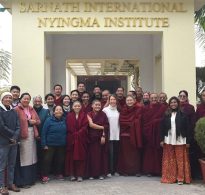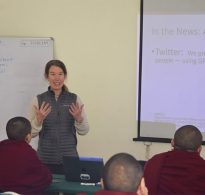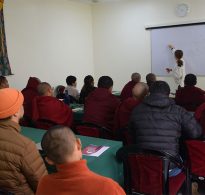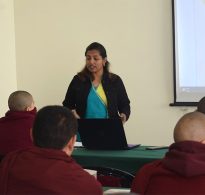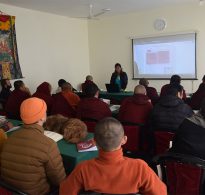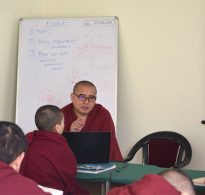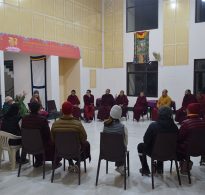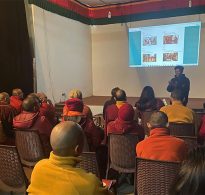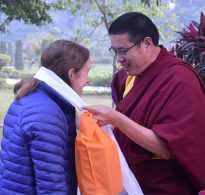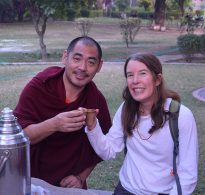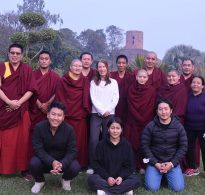Institute XVII- 4th Cohort Leadership Program
(5-20 January, 2023)
The 15day leadership programme for the fourth cohort was held at the Sarnath International Nyingma Institute (SINI) in Varanasi. The participants had classes in neuroscience, science writing, and Tibetan writing. Additionally, they had a designated time for “project time,” during which monks and nuns will have the opportunity to plan and complete their impending projects while speaking with the concerned teachers about their concerns.
The neuroscience teaching materials of this Leadership Workshop are largely driven by the interest of our participants, in accordance with their three-year projects. Consequently, a wide range of subjects is covered throughout this course. The topics include youth screen time and mental health, brain stimulation for depression treatment, kindness improves health, mindfulness vs. anxiety drug, theory of mind: male vs. female, gardening may help reduce cancer risk, and boost mental health.
In this particular session of the science writing program, students received comprehensive guidance and exposure to science writing. Suchitha showed a great level of knowledge. The workshop spent a lot of time discussing the fundamentals of science writing, engagement of a non-expert audience through effective communication, the necessity of having a scientific background, audience identification, the procedures involved, and various sorts of information sources.
During Redo Senge class, the participants were eloquently acquainted to notes on the introduction of the general meaning of “ thirty-five ornaments of meaning” from the Mirror of Poetics. Additionally, the class discussed renown Tibetan writers of different eras. The participants diligently embarked on writing and learning practices too.
About the teachers:
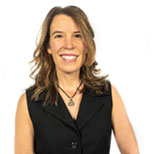
Dr. Becky Acabchuk
Dr. Becky Acabchuk is a Senior Scientist on the RoundGlass, a global wellbeing platform that aims to make wellbeing tools available to all. She has a PhD in Neurobiology and Physiology from the University of Connecticut. Becky’s research evaluates the health benefits of mindfulness and yoga, and investigates the science of behaviour change. She has conducted studies that evaluate tools to assist people in developing a meditation practice to self-manage stress. Rebecca leads mindfulness workshops tailored for a wide variety of audiences (e.g., workplace, schools, recovery groups, yoga studios, sport teams, and more), she has been teaching meditation, yoga and other wellness classes in the private sector for 18 years. As an adjunct professor, she taught courses that include the Neuroscience of Meditation and Health Psychology.
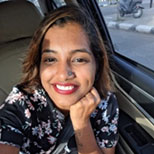
Suchitha Champak
Suchitha Champak founded SciRio to change how society views science. They help scientists, academic institutes, and enterprises share their advances in science creatively. At SciRio, she combines capacity building, collaborative projects, and unexplored markets to engage the public effectively. After working at the Indian Institute of Science and Centre for Human Genetics, she left the lab to prove that science is for everyone. She envisions a future where science and society co-evolve to empower everyone. She is a TEDx speaker, and news outlets like The Assam Tribune and BioPatrika have profiled her as a scientist-turned-entrepreneur. She also helped create proactive policies for science communication in the newest version of India’s STI Policy.
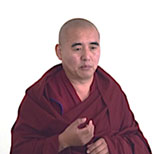
Redo Senge
Writer Redo Senge studied Tibetan language, epistemology, and Buddhist philosophy at Tagtsang Lhamo Kirti monastery in Domey (Amdo). After arriving in India in 1993, he got enrolled in the Kirti Jepa Dratsang Institute of Higher Tibetan Studies and studied the common and uncommon major and minor sciences. In 1997, he received the certificate of a bachelor’s degree in higher Tibetan studies. In 1998, since commencing to teach at the Kirti Institute of Higher Tibetan Studies, he was eventually honoured with the designations of junior teacher, associate professor, language professor, and professor. With this, he worked as a teacher for twenty-five years. Right now, he is working as a senior language professor.
Throughout these years, while engaging in editorial work and teaching, he studied the Compendium of valid cognition, philosophical tenets, perfection, and middle way philosophy at the Institute of Buddhist Dialectics.
Since 1999, while taking the responsibility of teaching at the institute, he has been working as a chief editor of the Institute of Higher Tibetan Studies and helmed the main responsibility in editing more than forty books.

